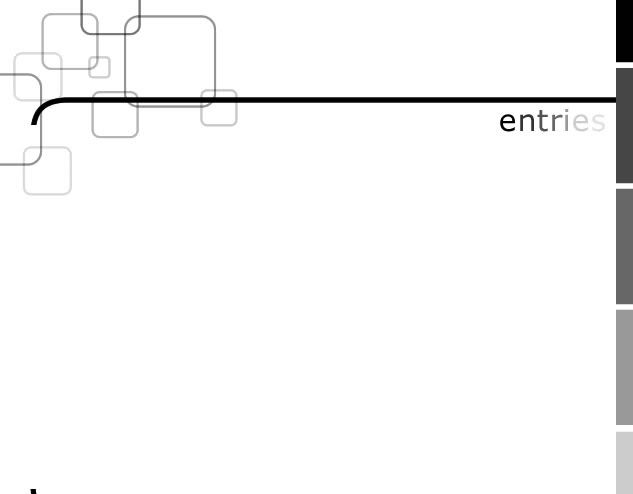Shodhan Sheth
22.m@Pune
single n lookin
shodhan[dot]sheth[at]gmail[dot]com
22.m@Pune
single n lookin
shodhan[dot]sheth[at]gmail[dot]com
linkZ n feedZ
ArKives

This work is licensed under a Creative Commons License.

Monday, November 28, 2005
n yew thought all browsers supported JavaScript
brain.delete[:JavaScript] if brain.has_key? :JavaScript
brain.delete[:javaScript] if brain.has_key? :javaScript
brain.delete[:java_script] if brain.has_key? :java_script
brain.delete[:javascript] if brain.has_key? :javascript
brain.delete[:JS] if brain.has_key? :JS
brain.delete[:js] if brain.has_key? :js
k. now we start afresh. first sun n netskape released something called JavaScript. n coz mikrosoft is an expert at kloning it introduced a 'roughly' compatible language kalled JScript. later JavaScript was submitted for standardization n thus it bekame ECMAScript. n now browsers are trying to bring in diversity in supporting different versions of ECMAScript either fully or partially.
brain.delete[:javaScript] if brain.has_key? :javaScript
brain.delete[:java_script] if brain.has_key? :java_script
brain.delete[:javascript] if brain.has_key? :javascript
brain.delete[:JS] if brain.has_key? :JS
brain.delete[:js] if brain.has_key? :js
k. now we start afresh. first sun n netskape released something called JavaScript. n coz mikrosoft is an expert at kloning it introduced a 'roughly' compatible language kalled JScript. later JavaScript was submitted for standardization n thus it bekame ECMAScript. n now browsers are trying to bring in diversity in supporting different versions of ECMAScript either fully or partially.
- Gekko n KHTML based browsers use JavaScript (ECMAScript-262 rev3) (mozilla n firefox klaim to partially support JavaScript 1.6)
- IE uses JScript (ECMAScript-262 rev3)
- Opera allows for ECMAScript-262 rev3 with both JavaScript n Jscript extensions
- ASP.Net allows for JScript.Net (ECMAScript-262 rev3)
- Flash uses ActionScript (ECMAScript-262 rev3). (ActionScript klaims to support spex that are still in early draft phases of ECMAScript; hence it is yet to be seen if they kan remain in synk)
Sunday, November 27, 2005
LazloMail - Stumbling Blok
as i pointed out in one of my prev posts, lazlomail is fast n pretty easy to use. there seems to be one major stumbling blok though. the klient neither renders html by default nor provides for an option to do so. kummon growUp. most of the eMails i reccieve are html based. at first i thought this was a flash problem. mabbe html rendering was a no-no as that would require flash to replikate part of wht the browser also does. but a quik search lead me to this which left me wondering as in why they have not implemented html rendering ??
Tags : Lazlo, Html, Lazlomail
Tags : Lazlo, Html, Lazlomail
Innovative testing
i just realized how mir.aculo.us.ly thomas fuchs tested his kode libraries required for fluxion. he openSourced them.
Tags : Fluxiom, testing, OpenSource, script.aculo.us
Tags : Fluxiom, testing, OpenSource, script.aculo.us
Saturday, November 26, 2005
Monkey Do
now, this has been lying in m pending folder for way too long.
MonkeyDo by koncept is way too klassy. though it does disappointment one a lil after using it a lil. it doesnt do as much as it sounds as if it kan do. kumin bak to the koncept in general, an intresting question pops up. kan a skript or some kindoff psuedo-orakle pre-empt what someone would want to post on del.icio.us n what tags the user might wanna use based on his/ her webHabbits. and if that were possible, wouldnt the whole koncept of taggin bekome superfluous??
Tags : MonkeyDo, futuristic, tags
MonkeyDo by koncept is way too klassy. though it does disappointment one a lil after using it a lil. it doesnt do as much as it sounds as if it kan do. kumin bak to the koncept in general, an intresting question pops up. kan a skript or some kindoff psuedo-orakle pre-empt what someone would want to post on del.icio.us n what tags the user might wanna use based on his/ her webHabbits. and if that were possible, wouldnt the whole koncept of taggin bekome superfluous??
Tags : MonkeyDo, futuristic, tags
been there, done that, surprised !!!
i took the blind taste test. n i CHOSE mirosoft. yeah. n most of the others did too.
Tags : search-engines, microsoft, google, yahoo
Tags : search-engines, microsoft, google, yahoo
Lazlo goes a step ahead
Rich UI webApps are of 2 kinds -- AJAX based or flash based. or atleast that was what i thought. with lazlo going ahead n adding XMLHttpReq support, the line has bekome thinner.
btw, if yew look at lazlomail; its pretty good konsidering that its flash based. atleast far better than goowy
Tags : Lazlo, AJAX, Flash, XmlHttpRequest, Lazlomail, Goowy
btw, if yew look at lazlomail; its pretty good konsidering that its flash based. atleast far better than goowy
Tags : Lazlo, AJAX, Flash, XmlHttpRequest, Lazlomail, Goowy
Tuesday, November 22, 2005
GroovY vs RubY {Closures} - II
Surprisingly while tryin to implement a simple closure example in ruby i overlooked a kouple of immensely helpful methods. with the excitement kooled down now, i present a simpler variant of the same.
Tags : Groovy, Ruby, Closures
class Array
def apply
collect! { |number| yield number }
end
end
a=[1,2,3]
a.apply { |i| i * i }
p a.to_s
Tags : Groovy, Ruby, Closures
Sunday, November 20, 2005
Koutes
Ruby's postulate
HTTP's dictum
XML
Tags : Ruby, HTTP, XML, Quotes
The accuracy of metadata is inversely proportional to the square of the distance between the data and the metadata.
HTTP's dictum
Thou shalt have no other gods before Me. Thou shalt not make unto thee a graven image, nor any manner of likeness, of any thing that is in heaven above.
XML
To paraphrase the Matrix, XML guys don't even see the angle brackets anymore
they just see blonde, brunette, redhead
Tags : Ruby, HTTP, XML, Quotes
GroovY vs RubY {Closures}
I was looking at Groovy closures and i was just wondering how easy it would be to implement the same example in ruby. and this is what i came up with
Unfortunately, it turned out to be a lot more skarier than i thought it would be.
make no mistake though, klosures ARE implemented equally, if not more, gracefully in ruby. the problem in this partikular kase is the fakt that [] and []= are methods in ruby. also note, i kant use each instead of each_index, as each does not synk the values of each individual array element bak to the original kopies. i think there should be an each! method. so now, since []= is a method i kannot kall [i]= direktly. i have to use the indirekt route of treating it as a setMethod(index, setValue)
Tags : Groovy, Ruby, Closures
class Array
def apply
each_index { |i| self.[]=(i, yield(self.[](i))) }
end
end
a=[1,2,3]
a.apply { |i| i*i }
p a.to_s
Unfortunately, it turned out to be a lot more skarier than i thought it would be.
make no mistake though, klosures ARE implemented equally, if not more, gracefully in ruby. the problem in this partikular kase is the fakt that [] and []= are methods in ruby. also note, i kant use each instead of each_index, as each does not synk the values of each individual array element bak to the original kopies. i think there should be an each! method. so now, since []= is a method i kannot kall [i]= direktly. i have to use the indirekt route of treating it as a setMethod(index, setValue)
Tags : Groovy, Ruby, Closures
Friday, November 18, 2005
Nitro ObjectGraph vs Rails ActiveRecord
my God!!! this is like the newsPaper thinggiee. Spot any 6 differences b/w Nitro`s OG n Rails` AR; only there are no differences !!!
Tags : Nitro, ObjectGraph, Rails, ActiveRecord
Tags : Nitro, ObjectGraph, Rails, ActiveRecord
Wednesday, November 16, 2005
Requirements Uncertainity Principle
we all know Heisenberg uncertainty principle. bringing it a lil into the s/w kontext, presenting the requirements uncertainity principle
Sunday, November 13, 2005
RSS is Web 2.0 ??
Need to connect any service to another service on the Web (or anywhere else)? Trying to mash together data? Building supply chains? There is generally no need to ever ask anyone to stand up a new web service. Pull everything you need via its RSS feed. Some software developers will disagree with this and say there are better methods, but to this I point out: 1) RSS is robust enough that it's all you'll ever need nine times out of ten and 2) it's what you're going to offered automatically anyway, take it and get something done.
RSS creates the Web 2.0 information ecosystem by enabling interconnectedness, network effects, emergent behavior, and much more as well. And RSS doesn't demand control of the other end of the conversation. This is a big enabler all by itself and is a classic Web 2.0 force. By letting consumers of RSS use any tool or service they want on their side, barriers are eliminated and connectivity is encouraged.
i think this is stretchin RSS a lil bit too much. btw, a del.icio.us survey on what is web 2.0 based on del.icio.us/tag/web2.0 RSS fares pretty low at 2.5%
Tuesday, November 08, 2005
the SOA triangulation
though i have read abundant marterial on webServices this kame as a first for me.
now, how kum i dint think of it that way?
about a triangular relationship - producer, consumer and directory.
now, how kum i dint think of it that way?
Sunday, November 06, 2005
 |
 |
|
 |
||
 |
||
 |
||


